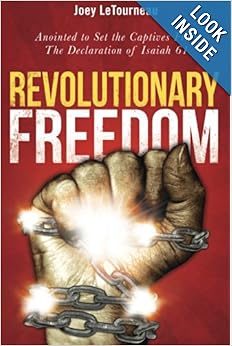
Revolutionary Freedom
by Joey LeTourneau
Taking the long winding journey through a prison, Revolutionary Freedom by Joey LeTourneau
is a wild ride into the themes of sin, Satan, and finding true freedom in
Christ. Throughout the path, we meet the
Warden (Satan), the Lord, Peter, Paul, Mary Magdalene and Abraham. The vivid telling of the story captures the
struggle between the deceiver, temptation, and lasting freedom found in
believing in Christ. Joey’s work with
Heavenly Hope Ministries has given him a profound look into broken children all
around Ethiopia and a clear understanding of the prisons that these children
have come from. This book will be very
well suited to those in the Charismatic movement but was also helpful for me to
see the subtleties that come about in the spiritual battle.
Joey is careful to see that the matter with the Christian
faith is not related to an outward adornment of the faith but an internal heart
change. He writes, “Many are satisfied
just to proclaim their religion as a kind of name tag. I don’t mind them wearing Jesus across their
chests – as long as they don’t walk closely with Him in their hearts.”
(33) The Warden here is speaking of the
way that he doesn’t mind an outward show of faith but is keen on watching for a
faith that is rooted in a changed heart.
Another point that Joey brings out through the mouth of the Warden is
people’s minds. He writes, “Sometimes we
feed them lies about positive things, telling them how strong or wise they are
on their own. I love it when people
start to depend on themselves more than do on God.” (34) Satan knows every trick in the book to
deceive people’s minds in to making them think of themselves as wise beyond
fault or despicable beyond redeeming.
Chapter 11 on Freedom is a good reminder about the present
reality of faith in Christ for today.
Joey says some good words here in this chapter. He writes, “My chains were gone. The Lord had washed them away and nothing
could hinder me as long as I walked by faith.
I remembered that it was not enough to be forgiven; I had to live forgiven.”
(137) To remember that our salvation is
in the hands of the Savior is a wonderful truth. Living forgiven is a matter of living by
grace. I also thought the map idea in
this chapter that pointed to God’s Word was a helpful way of looking at things. One of my concerns in the book was that I
hoped Joey would have talked more about our union with Christ, the sealing work
of the Holy Spirit, and grace. Other
than that, I enjoyed the journey of walking through the prison in reading this
book.
Thanks to SpeakEasy for the copy of this book in exchange
for an honest review.
Comments
Post a Comment